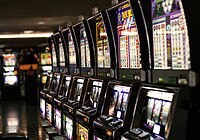
Neuroscientific evidence for pain being a classically conditioned response to trauma- and pain-related cues in humans.
Sign Up to like & getrecommendations! Published in 2022 at "Pain"
DOI: 10.1097/j.pain.0000000000002621
Abstract: ABSTRACT Psychological trauma is typically accompanied by physical pain, and posttraumatic stress disorder (PTSD) often co-occurs with chronic pain. Clinical reports suggest that pain after trauma may be part of a re-experiencing symptomatology. Classical conditioning… read more here.
Keywords: css; trauma; film; pain crs ... See more keywords

Effects of Winning Cues and Relative Payout on Choice between Simulated Slot Machines.
Sign Up to like & getrecommendations! Published in 2020 at "Addiction"
DOI: 10.1111/add.15010
Abstract: BACKGROUND AND AIMS Cues associated with winning may encourage gambling. We assessed the effects on risky choice of slot machine of: 1) neutral sounds paired with winning, 2) casino-related cues (such as the sound of… read more here.
Keywords: slot; payout; casino related; choice ... See more keywords

EXPRESS: Adult listeners can extract age-related cues from child-directed speech.
Sign Up to like & getrecommendations! Published in 2022 at "Quarterly journal of experimental psychology"
DOI: 10.1177/17470218221089634
Abstract: This study investigated adult listeners' ability to detect age-related cues in child-directed speech (CDS). Participants (N = 186) listened to two speech recordings directed at children between the ages of 6 to 44 months and… read more here.
Keywords: directed speech; age related; child directed; adult listeners ... See more keywords

The Neural Correlates of Implicit Cognitive Bias Toward Internet-Related Cues in Internet Addiction: An ERP Study
Sign Up to like & getrecommendations! Published in 2018 at "Frontiers in Psychiatry"
DOI: 10.3389/fpsyt.2018.00421
Abstract: Internet addiction is a sort of non-psychoactive substance dependence. The Implicit Association Test (IAT) is used to measure implicit cognition. Event-related potential (ERP) is one of the most widely used methods in cognitive neuroscience research… read more here.
Keywords: toward internet; internet; internet related; internet addiction ... See more keywords